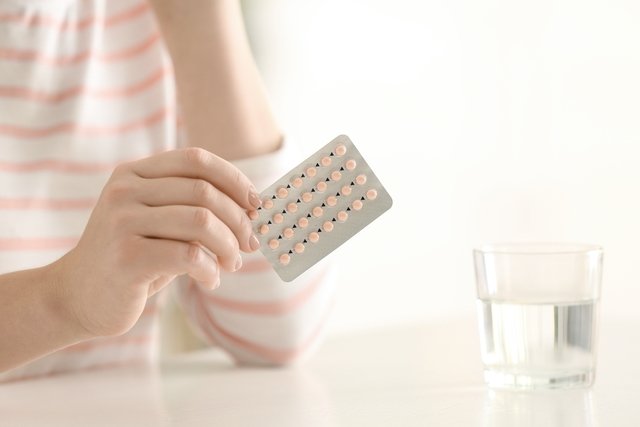Anyone who takes oral contraceptives every day, at the same time, does not have a fertile period and, therefore, does not ovulate, reducing the chance of getting pregnant, because, as there is no mature egg, it cannot be fertilized. This occurs both with 21, 24 or 28-day contraceptives, and also with hormonal implants or IUDs.
Oral contraceptives contain hormones, such as estradiol and/or progesterone, which inhibit ovulation and may also alter the uterine endometrium and cervical mucus, making it more difficult for sperm to reach the uterus, enhancing their effect on preventing pregnancy.
However, if a woman forgets to take a pill, especially in the first week of the pack, there is a chance of getting pregnant because she may ovulate and release an egg that, when met with sperm, can survive inside the woman for up to 5 7 days, it can be fertilized, and result in pregnancy.

What is menstruation like for people taking contraceptives?
The menstruation that comes every month, for those taking the contraceptive, is the result of the endometrium peeling caused by hormonal deprivation during the interval between one pack and another, resulting in bleeding or “artificial” menstruation.
This bleeding or false menstruation, during the interval between oral contraceptive packs, tends to cause less cramping and lasts fewer days than natural menstruation.
It is important to highlight that although taking contraceptives correctly is an effective method to prevent pregnancy, the pill does not protect against sexually transmitted infections (STIs), and it is important to always use a condom in all sexual relations. See what to do if you had sex without a condom.
Is bleeding in the middle of the pack normal?
Bleeding in the middle of the pack, for women who take the contraceptive pill correctly every day and at the same time, is considered normal and does not affect the effect of the contraceptive, that is, the pill continues to have its effect in preventing pregnancy.
The exact cause of this bleeding, also known as breakthrough bleeding or spottingis not fully understood, however, it is believed to be due to the progesterone in the pill, which promotes changes in the lining of the uterus, making it thinner, which can lead to bleeding, being more common in the first months of using the pill. contraceptive.
Breakthrough bleeding is more common in women who use contraceptives containing only progesterone or who have low hormonal dosage, for example, but it can also be caused by sexually transmitted infections. See other causes of breakthrough bleeding.
Taking care of your health has never been easier!
Do people who take the pill have PMS?
Those who take the contraceptive correctly may notice some changes in the days before menstruation, such as sore breasts, greater irritability and body swelling, which are known as premenstrual tension – PMS, but these symptoms are milder than if the woman does not take it. the contraceptive pill. Know how to identify PMS symptoms.
Is it possible to get pregnant while taking contraceptives?
Despite being a very effective contraceptive method, a woman can become pregnant while taking the contraceptive if:
1. Forgetting to take the pill at the same time every day. There are greater chances if forgetfulness occurs in the first week of the pack.
2. Taking any medication that reduces the effectiveness of the pill, such as antibiotics, immunosuppressants and anticonvulsants, for example, because they reduce the effect of the pill. See some medications that can reduce the effectiveness of the pill.
3. Vomiting or having diarrhea up to 2 hours after using the pill.
In these cases, pregnancy would be possible, as the woman could ovulate and, when having intercourse, the egg could be fertilized. See how to use the pill and not get pregnant.
Furthermore, the pill has a 1% failure rate and therefore, it is possible to get pregnant even if you take the contraceptive pill correctly every month, but this does not happen often.
See how to calculate your fertile period:
Bibliography
- COOPER, D. B.; PATEL, P.; MAHDY, H. IN: STATPEARLS (INTERNET). TREASURE ISLAND (FL): STATPEARLS PUBLISHING. Oral Contraceptive Pills. 2022. Available at: <https://www.ncbi.nlm.nih.gov/books/NBK430882/>. Accessed on March 24, 2023
- ZIGLER, RE; McNICHOLAS, C. Unscheduled vaginal bleeding with progestin-only contraceptive use. Am J Obstet Gynecol. 216. 5; 443-450, 2017
- EDELMAN, A; ET AL. IN: UPTODATE. Evaluation and management of unscheduled bleeding in individuals using hormonal contraception. Disponível em: <https://www.uptodate.com/contents/evaluation-and-management-of-unscheduled-bleeding-in-individuals-using-hormonal-contraception>. Acesso em 24 mar 2023
- ROYAL COLLEGE OF OBSTETRICIANS & GYNAECOLOGISTS. Management of Unscheduled Bleeding in Women Using Hormonal Contraception. 2009. Disponível em: <https://www.rcog.org.uk/guidance/browse-all-guidance/other-guidelines-and-reports/management-of-unscheduled-bleeding-in-women-using-hormonal-contraception/>. Acesso em 24 mar 2023

Sign up for our newsletter and stay up to date with exclusive news
that can transform your routine!
Warning: Undefined array key "title" in /home/storelat/public_html/wp-content/plugins/link-whisper-premium/templates/frontend/related-posts.php on line 12
Warning: Undefined array key "title_tag" in /home/storelat/public_html/wp-content/plugins/link-whisper-premium/templates/frontend/related-posts.php on line 13



